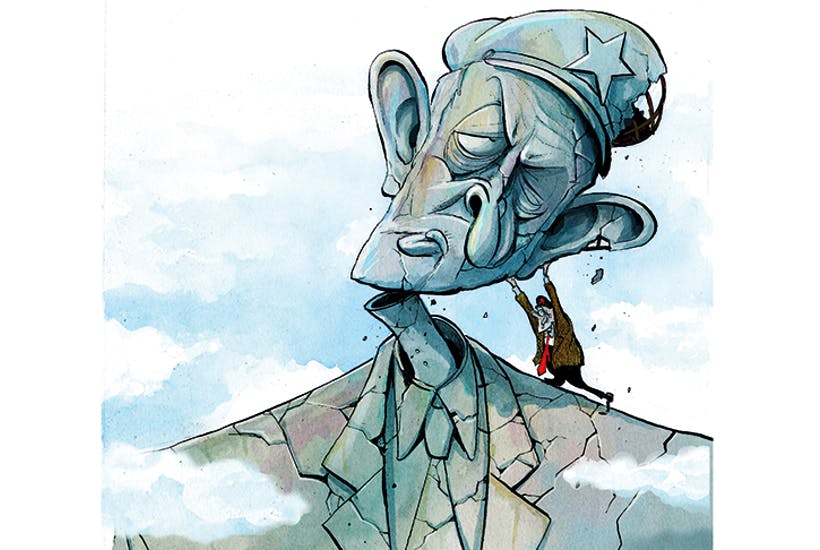Unless Jeremy Corbyn defies the odds, it looks unlikely that the Labour leader will become prime minister come 13 December. So what might happen if Corbyn loses for a second time? Will he try to cling on? Is there life for Labour after Corbyn?
Before the campaign began, John McDonnell conceded Corbyn could not remain leader if the party loses. If that sounded conclusive from the shadow chancellor, Len McCluskey subsequently muddied the water. Instead of Corbyn immediately stepping down, there should, he said, be ‘a period of reflection’ after any defeat. ‘We need to consider the election result’, he went on, ‘If it was a defeat … then we’d have to look at the scale of that, and where it happened. That requires some calm deliberation…there would have to be a proper debate and discussion.’ As General Secretary of Unite, and the single most important Corbyn supporter in the party, McCluskey’s words carry much weight.
These comments confirm the impression that Corbynites are not ready to let their leader go until they have established as best they can that his successor will be a like-minded figure. The party’s left wing is not prepared to relinquish the authority it has spent years chasing.
As part of that process they have plans to radically recast Labour’s constitution so it has two leaders, one each from a Leave and Remain constituency. However bizarre this might look to traditionalists, it could at least guarantee that one of the party’s leaders will be a Corbynite. Even McDonnell’s apparently definite statement on Corbyn’s future came with a caveat. The next leader should be a woman he declared. It is likely McDonnell sees this as a way of improving the chances of Rebecca Long-Bailey while spiking the guns of Keir Starmer, the non-Corbynite with the best chance of becoming leader after any defeat.
Starmer was certainly ahead of all other likely post-election candidates when members were surveyed in July this year. McDonnell was a close second, but he has ruled himself out of contention. On the basis of this survey, Corbynites will find it hard to retain the leadership: Long-Bailey and the other hard-left favourite Laura Pidcock can rely on just one third of members, the same as inveterate Corbyn critic Jess Phillips.
But with Corbynites plotting to keep Corbyn in place until after the immediate disappointment of defeat has passed – giving them time to rejig the constitution and construct a plausible narrative that throws the blame away from themselves – what will Labour MPs do?
The number of Corbyn loyalists among Labour MPs is likely to increase after the election whatever happens. Yet even taking into account this new intake, the vast majority of MPs will still have voted no confidence in the leader in 2016.
That turned out to be a huge mistake: MPs knew they didn’t want Corbyn but they had no credible candidate to replace him. He was easily returned, a reinvigorated figure.
So will they wait patiently for Corbyn to go in his own time or quickly force another contest before the hard left have their ducks in a row?
They will be able to say that they opposed the election and had it forced upon them by a leader who was incredibly unpopular with voters. Quite whether they have the chops to do this is unclear: since Labour’s surprisingly good result of 2017 most MPs have been afraid to take a stand against their leader.
The position of any non-Corbynite contender will also have to be carefully thought out. With about one third of Labour members up for grabs, do they attack Corbyn directly? If so, which policies do they highlight as in need of change?
After all, most of the policies contained in Labour’s 2019 manifesto are popular with most members. Do they offer a version of Corbynism but without Corbyn, or question the manifesto itself? The future course of the party will depend how they answer these questions.
Of course, this is all speculation: the campaign is not yet over. Labour members are still hoping Corbyn will defy the odds and win a Commons majority or at least deny Boris Johnson the numbers to take Britain out of the EU.
McCluskey and others will likely promote the latter result as a victory of sorts in the hope they can help Corbyn cling to office. Corbynites managed to persuade members to regard the 2017 result in very positive terms – but that saw Labour’s vote increase significantly on the back of a campaign which won widespread praise. But if Corbyn becomes a two-time loser and Labour having failed to actually win a general election since 2005, can they pull off the same trick again?
Steven Fielding is professor of political history at the University of Nottingham and is writing ‘The Labour Party: from Callaghan to Corbyn’ for Polity Press






Comments